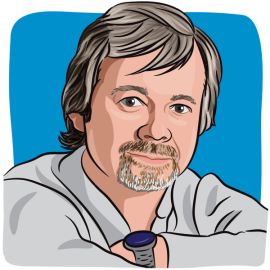- About Us
- Advertise / Support
- Editorial Board
- Contact Us
- CancerNetwork.com
- TargetedOnc.com
- OncLive.com
- OncNursingNews.com
- Terms & Conditions
- Privacy
- Do Not Sell My Information
- Washington My Health My Data
© 2025 MJH Life Sciences™ and CURE - Oncology & Cancer News for Patients & Caregivers. All rights reserved.
The Miracle Workers of Cancer

John Smelcer is the author of 60 books, including a dozen books of poetry. His most recent collection is "Raven." For a quarter century, he was Poetry Editor at "Rosebud Magazine," where he currently serves as senior editor emeritus. From 2016-2020, he was the Inaugural Writer-in-Residence for the Charter for Compassion, the world’s largest compassion movement with over five million members in 45 countries.
When a group of people told me my non-Hodgkin lymphoma cure was a miracle, I realized it was only made possible because of health care professionals.
One day somewhere in the middle of my battle with cancer, I walked into a local store where no one had seen me in months. When several lady customers saw my gauntness, my skeletal frame, my bald and shiny head and several ladies asked about my health. I told them I had been going through chemotherapy and immunotherapy for non-Hodgkin lymphoma. They asked if they could lay hands on me and say a little prayer. I know that some folks like to do that. They may even feel compelled to do so. I told them that I didn’t mind, and so they did, right there in the middle of the store. It looked like a scene from some movie.
Many months later, I saw the same group of ladies in the same shop. When they asked about my health status, I told them that I had recently “Rung the Bell,” signaling that I had beat my cancer. I didn’t look recovered, for sure. My body was still wasted away, but I was on the other side now. I was in recovery. Those women raised their hands in the air and shouted in unison, “Praise the Lord! It’s a miracle!” Naturally, I thanked them for their support and left.
But for days afterward, I couldn’t stop thinking about what they said: “It’s a miracle.” The more I thought about it, the more I realized that my cure was not a miracle. My cancer didn’t just vanish without a trace and without medical explanation. It was totally predictable. There was an established protocol, based on the experiences and treatments and outcomes of hundreds of thousands—even millions—of other patients diagnosed with the same cancer all over the world. From the beginning, my oncologist said that my survival rate was something like 87% or higher, based on previous studies.
I don’t mean to ruffle any feathers, or anything, but it bothered me to dismiss all the good people who played a role in my survival including the oncologists, nurses, techs, radiologists and all the scientists and researchers who developed the chemotherapy and immunotherapy protocols. Not to mention the pharmaceutical company scientists who developed the medications I was prescribed by my doctors. And I can’t forget all the phlebotomists who did my blood drawings, and the kind lady who worked at the desk at the hospital where I did my weekly blood draws in between hospitalizations. She always greeted me by name, which made me feel welcome.
And what about that superhero I call my wife? She drove me to every appointment, and she even stayed with me in the hospital during my first week-long hospitalization. We played chess to pass the time. She refilled all my meds for a year and made sure I took them as directed. She cleaned my PIC line (tube in the arm for chemotherapy) several times a day. Once, she even had to give me an injection in the belly at home because it was accidentally missed during one of my hospitalizations. In fact, the quality of care I received during treatment was because my wife’s workplace paid for my excellent health insurance. I owe her everything. I’ll happily repay her back with all the love I can give her for the rest of my life. I will never forget what she did for me. I hope and pray that you have someone like her in your life if and when the need arises.
The more I thought about what those ladies said, I thought that the miracle, if any, was that all those healthcare professionals pursued their education and training and licensure that led them inevitably to me and my cancer battle. To call my cure a miracle demeaned all those folks, their commitment and professionalism and sacrifices, and the arduous years they spent at university, and the massive student debt they must have amassed in the process of pursuing their career dreams. One preacher friend said that when he was visiting folks in the hospital, his prayer was not necessary that they be cured of whatever ailed them, but that they may be surrounded by caring and competent healthcare professionals. For all the good people that helped me, there is no way I can dismiss all the help afforded to me over six months of intense chemotherapy and immunotherapy. To my thinking, they are the true miracles.
For more news on cancer updates, research and education, don’t forget to subscribe to CURE®’s newsletters here.
Related Content:



